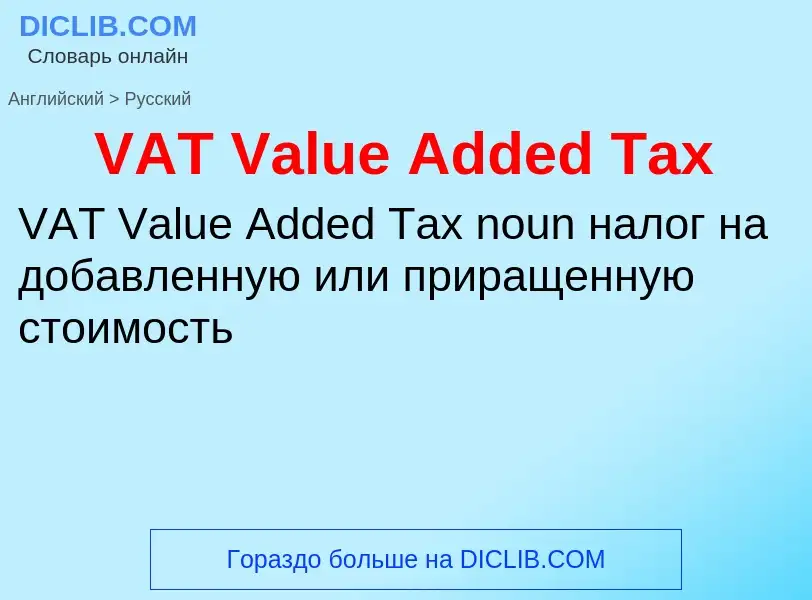ترجمة وتحليل الكلمات بواسطة الذكاء الاصطناعي
في هذه الصفحة يمكنك الحصول على تحليل مفصل لكلمة أو عبارة باستخدام أفضل تقنيات الذكاء الاصطناعي المتوفرة اليوم:
- كيف يتم استخدام الكلمة في اللغة
- تردد الكلمة
- ما إذا كانت الكلمة تستخدم في كثير من الأحيان في اللغة المنطوقة أو المكتوبة
- خيارات الترجمة إلى الروسية أو الإسبانية، على التوالي
- أمثلة على استخدام الكلمة (عدة عبارات مع الترجمة)
- أصل الكلمة
VAT Value Added Tax - ترجمة إلى إنجليزي
[vælju:'ædid]
бухгалтерский учет
добавленная стоимость (разница между ценностью продукции фирмы или отрасли и стоимостью сырья, комплектующих изделий и услуг (кроме рабочей силы, платы за землю), приобретаемых для обеспечения выпуска этой продукции)
статистика
условно-чистая продукция
экономика
стоимость
добавленная обработкой
условно чистая продукция
синоним
бухгалтерский учет
создание добавленной стоимости (деятельность по улучшению продукта или услуги или по повышению стоимости продукта или услуги, за которую покупатель готов заплатить)
Смотрите также
تعريف
ويكيبيديا
A value-added tax identification number or VAT identification number (VATIN) is an identifier used in many countries, including the countries of the European Union, for value-added tax purposes.
In the EU, a VAT identification number can be verified online at the EU's official VIES website. It confirms that the number is currently allocated and can provide the name or other identifying details of the entity to whom the identifier has been allocated. However, many national governments will not give out VAT identification numbers due to data protection laws.
The full identifier starts with an ISO 3166-1 alpha-2 (2 letters) country code (except for Greece, which uses the ISO 639-1 language code EL for the Greek language, instead of its ISO 3166-1 alpha-2 country code GR, and Northern Ireland, which uses the code XI when trading with the EU) and then has between 2 and 13 characters. The identifiers are composed of numeric digits in most countries, but in some countries they may contain letters.
Foreign companies that trade with private individuals and non-business organisations in the EU may have a VATIN starting with "EU" instead of a country code, e.g. Godaddy EU826010755 and Amazon (AWS) EU826009064.
From 1 January 2020 the valid VAT number of the customer is a material requirement to be able to apply the zero VAT rate for intra-Community supplies of goods in the EU. If the customer’s VAT number is not valid, 0% VAT rate cannot be applied. Companies must make sure that the VAT numbers of their customers are checked. You should always verify that the VAT number is valid in each corresponding country’s tax system, as giving false IDs is considered a form of fraud.

